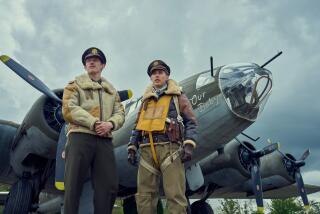U.S. Air Patrol Over Bosnia Watches, Waits : Military: Young pilots on the carrier Roosevelt have yet to see high drama. But they are prepared.
ABOARD THE THEODORE ROOSEVELT — As they await word from Washington that could send them to war, can-do Yankee confidence and a television-reinforced sense of disconnection share the cockpit with young Americans patrolling the skies over tormented Bosnia-Herzegovina.
Prowling at 30 knots through the Adriatic Sea between Italy and the former Yugoslav federation, the Virginia-based aircraft carrier Roosevelt is an instrument of major-league American intimidation, a heavyweight fact of life and international concern that must weigh on even the most uncontrollable of warlike Serbs in Bosnia.
The Theodore Roosevelt sails softly and carries a big stick.
“They know where the planes come from. They know the power and presence that reside out here,” Rear Adm. Jay L. Johnson of West Salem, Wis., commander of the carrier group, told visitors Friday.
Said Lt. Tony Gaiani of Lewiston, N.Y., who rides in an F-14 Tomcat over Bosnia, answering peaceably to the radio call sign Gandhi, “Aiding world peace is not something I think about on a combat air patrol.”
Heart of an 11-ship American battle group, the 97,000-ton nuclear carrier and its eight squadrons of jets have been contributing 12 to 14 sorties a day to enforce the U.N. ban of Bosnian airspace to Serbian planes, according to Capt. Stanley W. Bryant of Detroit, the Roosevelt’s skipper.
A British and a French carrier and land-based NATO jets from Italian bases also keep vigil around the clock.
No milk runs, but not high drama, either. Yet.
“Compared with other operations like Desert Storm, this has been a low-threat environment up to now,” said Capt. Charles W. Moore Jr. of Midland, Tex., commander of the Roosevelt’s air wing.
The early harvest of Operation Deny Flight is bittersweet: The air has been purged of Serbian planes, but on the ground Serbian ethnic purges continue.
Moore acknowledges the frustration among those who say that belated international intervention is too little too late for Bosnia’s Muslims. But, he says, the NATO airmen have done exactly what they have been asked to do.
“Our mission is to prevent aircraft flying, and in that we have been very successful. The number of aircraft flying over Bosnia since Deny Flight began is extremely small,” Moore said.
In Washington, President Clinton is deciding whether to add teeth to U.N. sanctions, perhaps by ordering air strikes against Serbian positions like the artillery that fearlessly terrorizes civilians in cities like the capital, Sarajevo.
And if the stakes suddenly go up?
“We have more capability than we are currently using,” Moore said dryly. “We can capably carry out Deny Flight or any other type of mission.”
Air crewmen like Lt. Steve Lloyd of Schenectady, N.Y., recognize that a peaceful routine of patrols, getting to know the Bosnian topography, where to turn off the Neretva River for Sarajevo, could end abruptly.
“So far there is no sense of threat, but it’s out there--missiles, fighters and so forth. We plan for it,” said Lloyd, call sign Mongo. “We think about what it can mean. But there are no doubts about carrying out whatever mission we get. There’s no fear they’ll sneak up on us.”
For the pilots who enforce it, Deny Flight, begun in early April, has thus far meant a lot of hours in mostly empty skies.
“Sometimes the Serbs fly MIGs in their airspace or patrolling their borders, but not much else is in the air,” said Gaiani, who is a radar and weapons officer on the Tomcat.
Commanders will not discuss the terms of engagement, and there have been no serious encounters reported, but a visitor wandering around the Roosevelt encounters crewmen with anonymous war stories to tell.
One said that Serbian ground-to-air missiles and antiaircraft artillery had locked on to patrolling NATO fighters more than once. In another instance, antiaircraft fire was aimed at a patrol plane, the pilots say.
More typically, said Lt. Cmdr. Wilk O. West of Lexington, Ky., an F-14 pilot, “some guy who can’t sleep hears your noise, points whatever he has up to the sky and shoots.”
“During the day you might sometimes see a destroyed bridge, but it’s deceptively peaceful, like flying over mountain terrain in the U.S. Most times it’s just driving around waiting until it’s time to go home,” said West, whose call sign, you guessed it, is Wilco.
One of the distinguishing characteristics of the Roosevelt as it awaits the next chapter in bloody Bosnia is an array of electronic gizmos on its port quarterdeck that make it the Navy’s prototype for satellite reception of live, round-the-clock U.S. television news.
And, lo, the 5,500 crew members have become news junkies.
“We’ve been at sea over 50 days, and normally that means you feel out of touch. The live television, though, adds an appreciation of the political dimension,” Johnson said.
Fliers say the televised sights and sounds of Bosnia’s anguish in their ready rooms could hardly be further from the impressions gathered from four or five miles up in the air. The contrast, they seem to say, makes Bosnia, and their role in its defense, seem more and less real at the same time.
More to Read
Sign up for Essential California
The most important California stories and recommendations in your inbox every morning.
You may occasionally receive promotional content from the Los Angeles Times.










